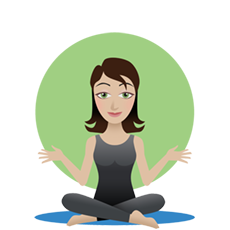Choosing Self-Compassion Over Self-Esteem

Is Self-Compassion More Important Than Self-Esteem?
An article I read suggested that it is. Growing up, I learned that self-esteem was critical, but the idea of self-compassion was less focused upon. Do they mean the same thing? Are they both important?
Self-concept is your view of yourself. It is how you see yourself without applying judgment: simply the facts. Our attributes and capabilities, and the roles we play, are components of our self-concept.
Self-esteem is how you feel about who you are, positively or negatively. In today's competitive culture, we tend to compare ourselves to other people (or sometimes to ourselves at another time). Our self-esteem is based on our perception of whether we are good or bad at various skills, and how we compare to others. “He's better than me, I'm the best in my class, etc.”
Article continues below...
Want to Go from Chaos to Calm?
Download a free tipsheet, "10 Tips for Calm & Confident Parenting." Use the coach-approach to change the tone in your home or classroom -- starting now!
Here's The Challenge:
For most of us, this competitiveness and comparison often puts us in a “less-than” or inferior position. This leads to feeling self-critical, rejected, and generally unhappy. As much as we would like to think otherwise, it is impossible to be better than everyone at all times. When we are always comparing ourselves, we constantly run the risk of “losing.”
Here's The Opportunity:
Choose self-compassion, the art of understanding and valuing where you are at any given moment. According to one researcher, self-compassion is “being kind and understanding toward oneself in instances of pain and failure, rather than being harshly self-critical.” For most of us, it's likely that the majority of our pain is self-inflicted. Self-compassion can decrease the suffering we create for ourselves (and couldn't we all use more of that?)
So how do you “do” self-compassion? Here's a few tricks:
- Notice when you are being self-critical and focused on competing with yourself and others. How does it help to compare yourself? What happens when you allow yourself (and everyone) to simply have experiences, opportunities and challenges?
- Treat yourself like your best friend. Typically, with close friends, we are honest and direct when called for, but we don't go out of our way to kick them when they are down, or rub their noses in their mistakes and failures. Replace the “are you kidding me?” with a pep-talk, a hug, an “atta-girl” or something more uplifting and supportive. When you get stuck in self-criticism, ask yourself, “What would my best friend say right now?”
- Realize that you are not alone. How many of the seven billion people on the planet have missed an appointment, said something unkind, lost a job, or done something that they have later regretted? This isn't to minimize what you experienced, but to understand that what happened is just part of being human.
- Recognize that your problems are relative. There is a meditation where you focus on a problem, and then expand it to a larger perspective: the problem is part of me, who is one person, in one town, in one state, in one country, on one planet, in one solar system, in one galaxy. When I try to “see” my problem while I'm looking at the vast field of stars and planets, it becomes much smaller and less meaningful.
- Have compassion for someone else. While not directly transferable, having compassion for others is a good practice to get into. I have a great deal of compassion for my daughter, and when I remember that there is a ten-year-old girl inside me who feels the same rejection and pain that she feels, (even if it is for different reasons) I can often switch my perspective and increase my compassion for myself.
As humans, one of our primary needs is to feel connected, like we “belong.” Our natural tendency to compare and isolate ourselves from each other is in direct conflict with this.
My challenge to you: take notice when you fall short on self-compassion. Instead, “try a little tenderness.”


